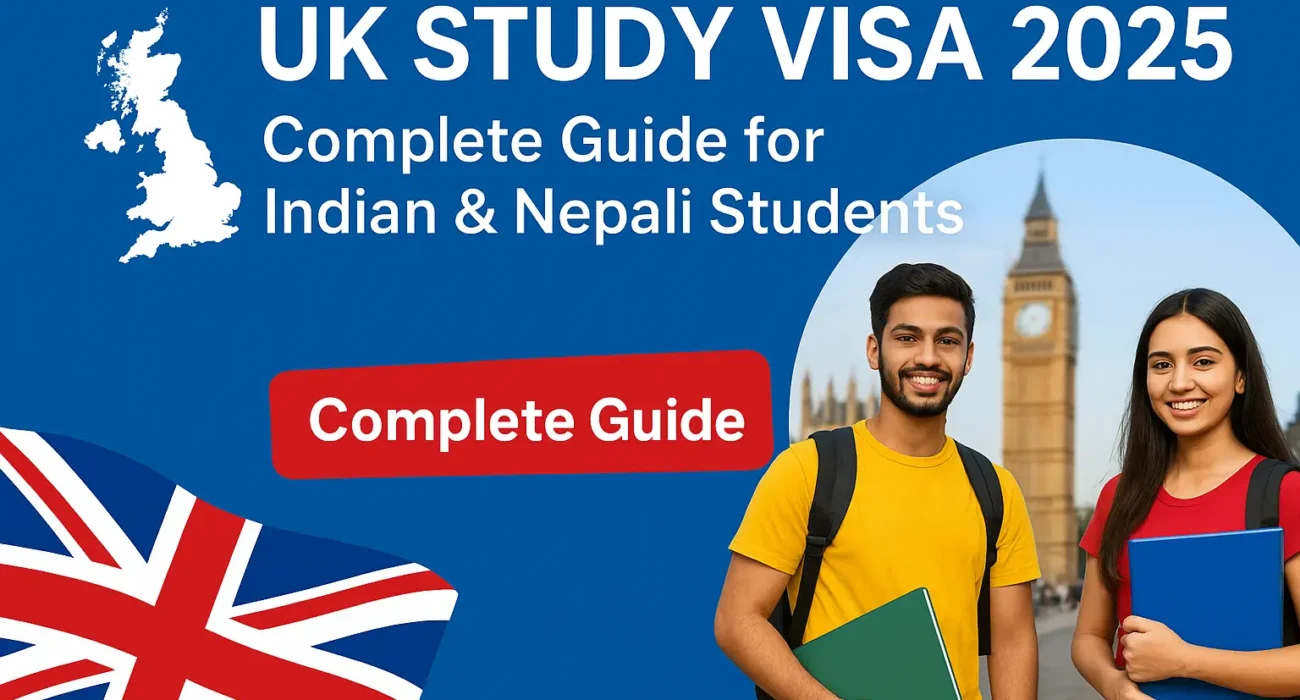A lot of students from India and Nepal dream of studying in the UK. The UK has great universities, degrees that are known everywhere, and lots of different cultures, so it’s a popular place to go for college. If you’re thinking about applying for a UK Study Visa in 2025, this guide has all the important stuff you need to know—who can apply, how to apply, what papers you need, how much it costs, scholarships, if you can work while studying, and what jobs you might get later.
Why Choose the UK for Higher Studies?
Before diving into the visa process, let’s understand why thousands of Indian and Nepali students choose the UK every year:
-
Top-ranked Universities – Oxford, Cambridge, Imperial College, University College London (UCL), and many more.
-
Wide Range of Courses – From engineering, business, and IT to creative arts and humanities.
-
Shorter Duration of Courses – Undergraduate courses usually take 3 years and master’s degrees often just 1 year.
-
Global Recognition – UK degrees are respected worldwide.
-
Post-Study Work Opportunities – The UK Graduate Route allows students to stay back for 2 years (3 years for PhD) after graduation.
-
Cultural Diversity – Over 600,000 international students study in the UK each year.
Types of UK Study Visas for 2025
-
Student Visa (formerly Tier 4)
-
For students aged 16+ who want to pursue higher education in the UK.
-
Based on the points-based immigration system.
-
-
Child Student Visa
-
For students aged 4–17 who want to study at an independent school in the UK.
-
-
Short-term Study Visa
-
For students studying English language courses for 6–11 months.
-
Most Indian and Nepali students will apply for the Student Visa.
Eligibility Criteria for UK Student Visa
To apply for a UK Study Visa in 2025, Indian and Nepali students must meet the following criteria:
-
Offer from a UK Institution – You must have a Confirmation of Acceptance for Studies (CAS) from a licensed university or college.
-
English Language Proficiency – IELTS, PTE, TOEFL, or other approved tests.
-
Financial Proof – Show that you can cover tuition fees and living expenses.
-
Genuine Student Requirement – The UK visa officers must be satisfied that you are a genuine student.
Documents Required for UK Student Visa
-
Valid Passport
-
Confirmation of Acceptance for Studies (CAS)
-
Proof of funds (bank statements, loan documents, or sponsorship letter)
-
English proficiency test results (IELTS/TOEFL/PTE)
-
Academic certificates and transcripts
-
Tuberculosis (TB) test results (mandatory for India & Nepal)
-
ATAS certificate (if required for certain subjects)
-
Recent passport-size photographs
-
Visa application fee and Immigration Health Surcharge (IHS) receipt
Financial Requirements
Students must prove they can support themselves while studying in the UK:
-
Tuition Fee – As mentioned in your CAS.
-
Living Costs:
-
£1,334 per month if studying in London (for up to 9 months).
-
£1,023 per month if studying outside London (for up to 9 months).
-
Example:
If your tuition fee is £15,000 and you are studying in London, you need to show around £27,000–£28,000 in your bank account.
Application Process for UK Study Visa 2025
-
Get an Admission Offer – Apply to universities via UCAS or directly.
-
Receive CAS (Confirmation of Acceptance for Studies).
-
Prepare Documents – Gather financial and academic proofs.
-
Apply Online – Fill out the visa application form on the UKVI website.
-
Pay Visa Fee & IHS –
-
Visa fee: £490
-
Immigration Health Surcharge (IHS): £776 per year
-
-
Biometric Appointment – Submit fingerprints and photographs at the Visa Application Centre (VAC) in India or Nepal.
-
Attend Interview (if required).
-
Visa Decision – Usually takes 3–6 weeks.
Processing Time
-
Standard Processing – 3 to 6 weeks.
-
Priority Service – Extra fee, decision in 5–10 days.
-
Super Priority Service – Extra fee, decision within 24 hours.
Cost of Studying in the UK (2025)
-
Undergraduate Courses: £10,000 – £20,000 per year.
-
Postgraduate Courses: £12,000 – £25,000 per year.
-
Living Costs: £9,000 – £15,000 per year depending on location.
Scholarships for Indian & Nepali Students
-
Chevening Scholarships – Fully funded UK Government scholarships.
-
Commonwealth Scholarships – For master’s and PhD students.
-
GREAT Scholarships – Partnership between UK universities and the British Council.
-
University-specific Scholarships – e.g., Oxford, Cambridge, UCL, and Manchester offer partial fee waivers.
Part-time Work Opportunities for Students
International students can work while studying in the UK:
-
Up to 20 hours per week during term time.
-
Full-time during holidays.
-
Common jobs: Retail assistant, restaurant staff, delivery, library assistant, teaching/research assistant, IT support.
Part-time jobs not only provide financial support but also valuable work experience.
Post-Study Work Visa (Graduate Route)
After completing your degree, you can apply for a Graduate Visa:
-
2 years stay for undergraduate and master’s students.
-
3 years stay for PhD students.
-
Allows you to work full-time or look for jobs.
Many Indian and Nepali students use this route to gain international experience before applying for permanent residency or moving to other countries.
Career Prospects After Studies
The UK has high demand for skilled graduates in:
-
Information Technology (IT & Software)
-
Business & Management
-
Engineering & Construction
-
Healthcare & Nursing
-
Finance & Banking
-
Hospitality & Tourism
Indian and Nepali students with work experience in these fields often find long-term career opportunities in the UK.




